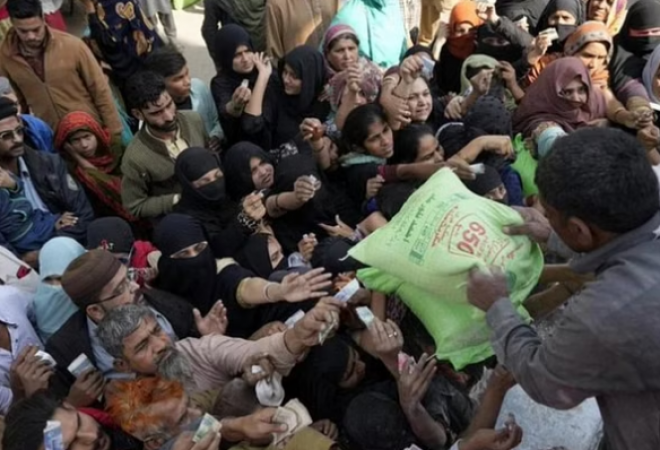
Peshawar: Several people were injured when the crowd moved forward as soon as some trucks arrived. A man, Harsingh Kolhi, died in the commotion while trying to bring home a five kg bag of flour for his wife and children.
According to Dawn, after the chaos subsided, a group of onlookers took Kolhi's body to the neighborhood press club and demanded that a murder case be filed against the province's authorities for both the rampage and the stampede.
The incident is just one example of how Pakistan's poorest citizens are already feeling the effects of the country's worsening food shortages and impending economic crisis.
Also Read: Global optimism increases going into 2023
Government officials estimate that devastating summer floods damaged more than 80% of the country's crops, and the country is still recovering from those events as it grapples with economic unrest that has caused food and medicines to remain in ports. .
According to the State Bank of Pakistan, the country's foreign exchange reserves now stand at just $4.3 billion, barely enough to cover three weeks' worth of imports.
According to Yunus, the purchasing power of Pakistan's blue-collar workers has decreased by about 30% in the past four years. These people are mainly from lower middle and lower class and earn $2 per day.
Before former Prime Minister Imran Khan's party came to power in 2018, the government borrowed heavily in dollars to finance development while maintaining an extremely high exchange rate. By 2018, the country's foreign exchange reserves were severely depleted, making it impossible to continue with the policy of using an overvalued exchange rate. Khan's party was forced to request a $6 billion economic bailout from the IMF in 2019.
Due to the advent of COVID-19, the IMF program was put on hold in March 2020. Since then, there have been several starts and stops because, according to Yunus, the government has not complied with all of the IMF's requirements.
Imports are being delayed at ports in an attempt to attract dollars, which is affecting everything from food to medicine. Onion prices are skyrocketing now as onion containers are stuck at the port due to bank failure to make payments. "In a country of 230 million on the brink of default, supply chain shortfalls are bound to happen, especially for imported food and medicine."
Pakistan's Poultry Association protested a Rs 162 (or 45%) hike in poultry prices in December due to a two-and-a-half-month delay in shipments of soybeans, a staple in chicken diets.
The country's Ministry of National Health Services, Regulation and Coordination has issued a warning, saying that due to the reluctance of local banks to open letters of credit for the import of pharmaceutical raw materials, the country could soon face a shortage of life-saving drugs. may have to face. ,
The international community, including France, the European Union and China, pledged more than $10 billion in loans to help Pakistan recover from flood damage at the Pakistan government and the International Conference on Climate Resilient Pakistan hosted by the United Nations in Geneva. earlier this week.
The one-day conference served as a platform for the presentation of a strategy for a climate-resilient reform and for seeking ongoing support from the public and private sectors.
It also served as a possible test case for requiring large emitters to cover damages and losses incurred by small emitters bearing the brunt of climate change.
Yunus explains that for the time being these are just promises; It could be months before this money actually appears, and when it does, it will likely be used to fund special reconstruction plans.
Yunus said it was "anybody's guess" when a deal would be reached. Since last September, Pakistan and the IMF have been unable to agree on a funding plan totaling $1.1 billion.
Army chief General Syed Asim Munir recently visited the United Arab Emirates and Saudi Arabia in an effort to get more loans from those countries.
The Pakistani government needed to meet a number of requirements in order to receive the money, including an increase in taxes and energy prices.
Former prime minister Khan subsidized energy prices when he left office in April last year after a no-confidence vote, just as the war in Ukraine was driving energy prices up significantly around the world. He was essentially building a minefield for the new administration.
Also Read: india likely to become usd7 tn economy in 7 years
The government is reluctant to take any actions that might make them unpopular with voters given that elections are expected in August (or possibly sooner, as Khan's Tehreek-e-Insaf party is pushing to dissolve provincial assemblies in a bid for earlier elections).
Younus asserts that a political party in power would not want to impose price increases and increased inflation in the lead-up to an election. Why would you cause your citizens more suffering?
Routines and choices that were once thought of as simple, claims Younus, have become much more challenging. Doctors are reportedly starting to notice adult malnutrition in adults who have stopped eating two meals a day.
Teachers in schools have reported that parents have asked them, "I have four children; which one should I keep in school?" I am unable to cover the other three students' tuition costs.